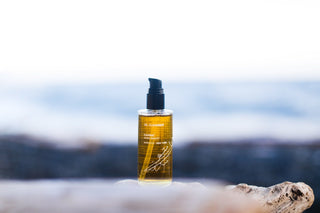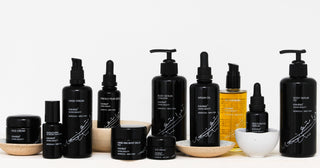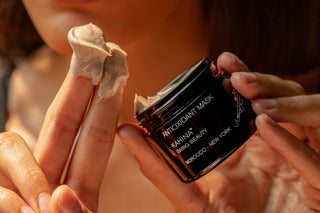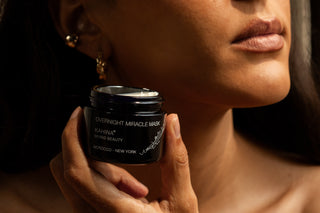The Wall Street Journal examines the health benefits of argan oil.
"In Morocco, argan oil is used to dip bread in at breakfast or to drizzle on couscous or pasta. World-wide, it's gaining a reputation both as an ingredient in high-end, personal-care products and as a heart-healthy gourmet product.
The golden-colored oil, extracted by hand from the fruit of a thorny tree that grows in southwest Morocco, soothes rough skin and gives hair a nice shine, dermatologists say. But while some argan-oil cosmetic products are marketed as anti-aging, there is no evidence it slows signs of growing older.
When ingested, preliminary studies suggest the nutty-flavored oil may have heart-health benefits comparable to olive oil. The data are "encouraging" says Michael Miller, director of the University of Maryland's Center for Preventive Cardiology in Baltimore, but "the jury is still out" on its health benefits.
To make argan oil, Moroccan workers—mostly women—peel the outer layer of the tree fruit then pound its inner nut with a rock to extract kernels, from which the oil is extracted. When the oil is destined for consumption, the kernels are roasted before pressing to add flavor, says Zoubida Charrouf, a professor of chemistry at Mohammed V University in Rabat, Morocco, and president of a nonprofit association that helps start women's cooperatives to make the oil.
Argan oil can be directly applied to the face, skin, hair and cuticles, or added to other products. The oil is named as an ingredient in 111 personal-care products introduced in the U.S. last year, compared with only two in 2007, according to market-research firm Datamonitor, a unit of Switzerland's Informa Group.
"It's a nice light oil that mixes well with cosmetics and has good aesthetics," says Zoe D. Draelos, a consulting professor of dermatology at Duke University School of Medicine in Durham, N.C.
Companies say argan oil's nutrient-rich composition—including vitamin E and an omega-6 fatty acid called linoleic acid that has anti-inflammatory properties—makes it healthy for the skin. Amal Oils LLC of Miami, which says it sources its oil from a women's cooperative in Morocco, adds that it takes one worker 45 minutes to crack enough nuts to make a four-ounce bottle of its cosmetic oil, which sells for $85 and lasts four to six months. Amal's website says the oil helps hydrate skin and "fight signs of aging" and "restore health to hair" and tame frizz.
It makes sense antioxidants could protect skin from sun and free-radical damage when absorbed by the skin, dermatologists say, but some argue it's unlikely antioxidants in argan oil will penetrate deeply enough into the skin to have a benefit.
"Oils don't get past the surface of the skin. They just sit there," says Yale University dermatologist Lisa M. Donofrio. Some formulations with argan oil may contain chemical "carriers," which help the oil penetrate, she adds. Amal Oils says argan oil penetrates the skin naturally.
The amount of oil used in personal-care products—ranging from face masks and shampoos to make-up and shaving creams—can vary from just a trace to a substantial amount. Giving Beauty LLC's Kahina face Serum has 90% argan oil by volume, while its Antioxidant face Mask—made mainly of Moroccan clays—has only a small amount, the New York company says. The serum costs $90 for a one-ounce bottle, while the mask is $62 for a 1.6-ounce jar.
Consumers should look for 100% argan oil and avoid blends labeled "Moroccan oil," which may contain only a small amount of argan oil and are often "heavy, gooey and yellow," says Los Angeles dermatologist Susan Kallal, who sells Kahina products in her office. She says she recommends argan oil as moisturizer and to help treat acne.
A small but growing body of research suggests the oil may be heart healthy. A 152-woman study by Mohammed V University's Dr. Charrouf and colleagues found statistically significant increases in vitamin E blood levels in subjects who consumed five teaspoons of argan oil daily for two months. Cholesterol levels also dropped, but the effect wasn't statistically significant, according to the study, which was presented at a scientific conference in Rabat in February.
In another study, published in 2005 in the journal Nutrition, Metabolism and Cardiovascular Diseases, Moroccan researchers fed 60 male student nurses either olive oil or argan oil with toast for breakfast for three weeks. At the end of the study period, blood samples were taken and both oils worked about equally to stimulate activity of an enzyme believed to protect against oxidative damage that can lead to heart disease.
The study provides initial evidence that argan oil is "in the same ballpark" as olive oil for heart health, but there is no proof it's any better, says the University of Maryland's Dr. Miller.
Road Test
In an informal taste test, Zamouri Spices culinary argan oil, which has 40 calories a teaspoon, had a rich, pleasant nutty flavor. The oil from Elbertai Co. in Olathe, Kan., sells for $30 for a 5.1-ounce bottle.
I also tried both Amal's pure argan oil on my skin and the Kahina brand from Giving Beauty, which costs $36 for a one-ounce bottle. Both oils felt non-greasy and left my skin feeling softer. A control test with extra-virgin olive oil also resulted in softer skin but it felt heavy and greasy."
Click here to read the original article.





